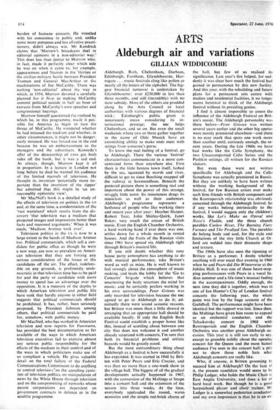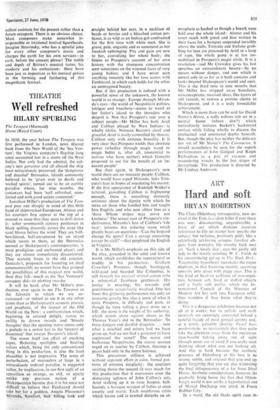ARTS Aldeburgh air and variations
GILLIAN WIDDICOMBE
Aldeburgh, Bath, Cheltenham, Durham, Edinburgh, Farnham, Glyndebourne, Har- rogate ... music festivals cling like pollen to nearly all the letters of the alphabet. The big- gest financial turnover is undertaken by Glyndebourne: over f.250,000 in less than three months, and still (incredibly) with no state subsidy. Most of the others are prodded along by the Arts Council or local authorities with various degrees of financial stick: Edinburgh's public grant is notoriously mean considering its in- ternational prestige; the BBC helps Cheltenham. and so on. But even the small weekends where two or three gather together in the name of Olde Musick have an astonishing ability to make ends meet with strings from someone's purse.
To know the real feeling of a festival, go to Aldeburgh. There the various 'festival' characteristics communicate in a more con- centrated form than anywhere else. First there is the little hostess town itself, lashed by the sea, squeezed by marsh and river, difficult to get to since Beeching snapped off the railway at Saxmundhain. Beneath the postcard picture there is something real and important about the power of this strange, straggly little town. Its remoteness drugs its musicians as well as their audiences.
• Aldeburgh's programme represents a hothouse of people who like working there and return year after year: Heather Harper, Robert Tear, John Shirley-Quirk, Janet Baker; very much the cream of British music. Even the English Chamber Orchestra, a hard working band if ever there was one, settles down for a whole month in rented houses. And the fruits of the Russian visits since 1961 have spread via Aldeburgh right through Britain's musical life.
If you still doubt whether this cosy house party atmosphere has anything to do with musical performance, take Britten's word as well as mine. He is well known to feel strongly about the atmosphere of music making, and leads the lobby for the `Go to Concerts' brigade which believes that smartening the body smartens the mind for music; and he certainly prefers working in his own surroundings. Peter Grimes was only recorded for television because the BBC agreed to go to Aldeburgh to do it; ad- mittedly there were sound acoustic reasons, but Britten was more than a little shrewd in arranging that an appropriate hall should be available locally. If only the English Bach Festival could establish a proper home like this, instead of scuttling about between one city that does not welcome it and another already saturated with concerts, I'm sure that both its financial problems and artistic hazards would be greatly eased.
But the most extraordinary thing about Aldeburgh as a festival is how successfully it has expanded. It was started in 1948 by Brit- ten with Peter Pears and Eric Crozier, and was then no more than a one-week show in the village hall. The biggest of all the gradual developments actually happened in 1967, with the conversion of the Maltings at Snape into a concert hall and the extension of the season into three weeks. At the time, everybody applauded the round, warm acoustics and the simple red-brick charm of
the hall, but few of us realised its significance. Last year's fire helped, for sud- denly it was clear how much the festival had gained in permanence by this new facility. And this year, with the rebuilding and future plans for a permanent arts centre with studios and residential facilities, it no longer seems heretical to think of the Aldeburgh festival without its presiding genius.
I find it almost impossible to assess the influence of the Aldeburgh Festival on Brit- ten's music. The Aldeburgh personality was there before—Peter Grimes was written several years earlier and the other big operas were mostly premiered elsewhere—and there is no easy mark that spots one work more than another until, curiously enough, the re- cent years. During the late 1960s we have had works like the Cello Symphony, the two Unaccompanied Cello Suites and the Pushkin settings, all written for the Russian visitors.
But even these were not written specifically for Aldeburgh and the Cello Symphony was actually premiered in Russia. But they are unlikely to have been written without the working background of the festival, for few Russian artists ever make such firm friends with British composers and the Rostropovich relationship was obviously cemented through the Aldeburgh festival. So if any works belong intrinsically to the festival, I would suggest only the children's works, hie Let's Make an Opera! and Noye's Fludde, and the three church parables Curlew River, The Burning Fiery Furnace and The Prodigal Son. The parables do belong body and soul, for the style and limitations of the tiny little Church at Or- ford are welded into -their dramatic shape and texture.
The 1960s have also seen the ripening of Britten as a performer. I doubt whether anything will ever excel that evening in 1966 when he and Pears did Die Winterreise at the Jubilee Hall. It was one of those heart-stop- ping performances with Pears in a vocal In- dian summer and a life-time's musical feeling in the accompaniment. Oddly enough, the next time they did it together, which was in one of Ian Hunter's City of London festival concerts the following year, the whole point was lost by the huge acoustic of the Guildhall. The performance might have been identical but the rapport was lost. Since then. the Maltings have given him room to expand as an orchestral conductor, and the Tchaikovsky concert in 1968 with Rostropovich and- the English Chamber Orchestra was another great Aldeburgh oc- casion. This year it is still too early to say. except to grumble mildly about the opening concert for the Queen and the most hatted audience I've seen in the concert hall: a pity not to show those noble hats what Aldeburgh concerts are really like.
Who, if anyone, is Britten grooming to succeed him at Aldeburgh? On the face ot it. the present candidate would seem to be Philip Ledger, who holds the Music Chair at East Anglia University, and does a lot of hard local work. But though he is a good harpsichord player and choir trainer, Mr Ledger is a somewhat pedestrian conductor; and my. own impression is that he is an ex- cellent assistant for the present rather than a future occupant. There is no obvious choice. Most composers make somewhat ir- responsible or irrational festival figureheads. Imagine Stravinsky, who has a spiteful joke for every other composer's music and charges the earth for his own services—in cash, before the concert please! The width and depth of Britten's musical tastes, his modesty and his enthusiasm: these have been just as important as his musical genius in the forming and furthering of this magnificent festival.































 Previous page
Previous page